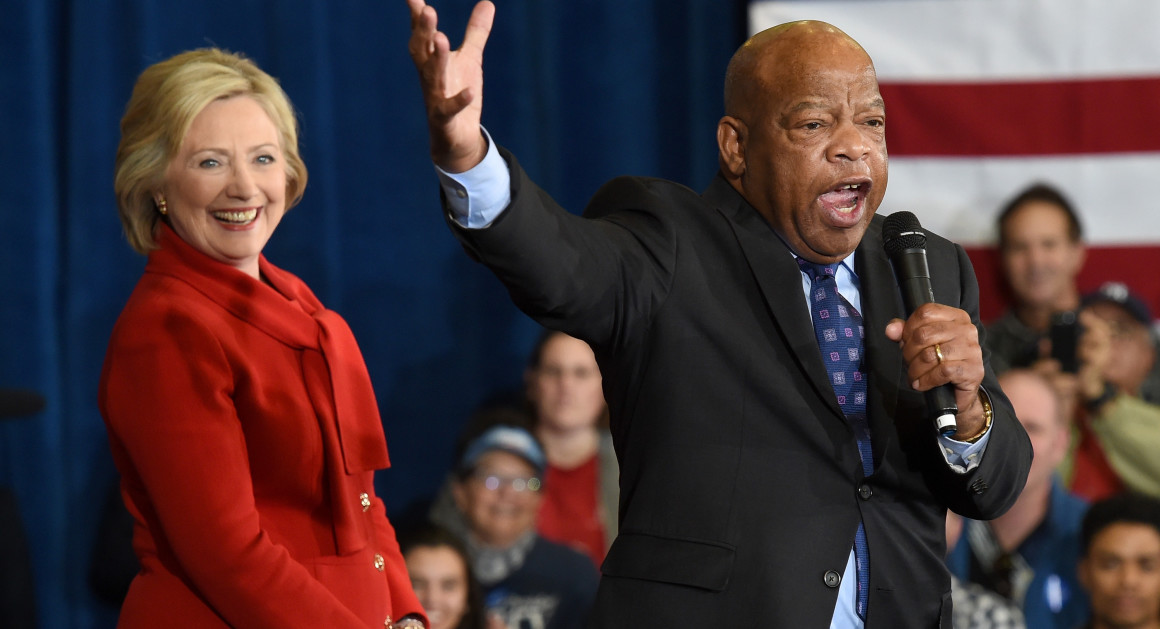
LAS VEGAS - In 2008, John Lewis dealt Hillary Clinton a devastating blow by switching his support from her presidential campaign to upstart Barack Obama, providing a critical validation to the first-term Illinois senator from one of the nation’s most prominent and respected veterans of the civil rights era.
Now, eight years later, Lewis is making up for it.
The Georgia congressman is in the midst of a pedal-to-the-metal attempt to shore up her support among African-Americans in the run-up to the Feb. 27 South Carolina primary and the more diverse states to follow.
After publicly endorsing Clinton Thursday on Capitol Hill with other members of the Congressional Black Caucus, Lewis traveled here to appear by her side and hold solo events designed to bolster her campaign.
On Sunday, when the civil rights icon sat next to Clinton in the first row at Victory Missionary Baptist Church in a historic African American neighborhood in West Las Vegas, he offered a glowing introduction.
“If there is one person ready to be President day one, [it’s] this woman. She’s been a senator, secretary of state. Look, she is prepared, she is ready, Hillary Clinton,” he said.
Lewis also appeared at a rally for her Sunday evening, before talking to close to two dozen grade-school children at a basketball court here Monday.
“I’m here in Las Vegas to support a good friend of mine,” Lewis told the group before racing off to do a local radio interview. “I’ve known her husband, President [Bill] Clinton. You have to tell your mothers, your fathers, your teachers to participate in the caucus.”
“With Hillary Clinton as president, we can make our country better.”
In an interview Monday, Lewis acknowledged the difficulty surrounding his 2008 decision to defect to Obama after serving as one of Clinton’s leading African-American supporters. His switch, which came after Obama showed his tremendous popularity among African-Americans by winning 78 percent of their vote in South Carolina, came as other black elected officials were wavering -- and placed one of America’s most influential voices in the first-term senator’s camp.
“It was a very tough decision when I switched,” Lewis said. “She understood, President [Bill] Clinton understood.”
Lewis said his advocacy for Clinton is not an attempt to make amends, but rather is a reflection that she is the person best suited to be president.
“You have people who come along from time-to-time who I call a ‘firecracker.’ A firecracker just shoots off. Others come along who continue to burn, and she’s one of these people who will continue to burn,”
he said.
Lewis’ storied history in the civil rights movement and his stature is such that his is no ordinary endorsement -- and he is no ordinary
campaign trail surrogate. According to Engagement Labs, a data analytics company, Clinton’s top most-engaged Facebook post on the day of the Feb. 11 Democratic debate was one quoting Lewis’s endorsement, which received about 17,700 likes and 2,800 shares.
Lewis’ dismissal of Sanders’ civil rights background last Thursday was even more consequential, leaving the Vermont senator’s campaign and his allies stunned by its force.
“To be very frank, I never saw him, I never met him,” said Lewis, in response to a question about Sanders’ civil rights record. “I chaired the Student Nonviolent Coordinating Committee for three years, from 1963 to 1966. I was involved in sit-ins, in the Freedom Rides, the March on Washington, the March from Selma to Montgomery ... but I met Hillary Clinton.”
Recognizing the potential damage from Lewis’ remarks, Sanders allies including Rep. Keith Ellison (D-Minn) and former Hawaii Gov. Neil Abercrombie sought to defend the senator.
Abercrombie, a white former House Democratic colleague of Lewis and Sanders, wrote an anguished letter Friday to the Georgia congressman.
“I’m writing to you in a state of shock and disappointment as an admirer of long-standing and a colleague of more than two decades. Your remarks about Senator Sanders and his civil rights record are deeply offensive not only to me but to hundreds of thousands of others dedicated to and participants in the Civil Rights Movement,” the former governor wrote. “In all honesty, John, when did you become the doorkeeper at the entrance to the Civil Rights gate? I cannot fathom how you think you advance the cause for Secretary Clinton by denigrating Senator Sanders or anyone else no matter how modest their contributions might be in your eyes.”
While Lewis later clarified his comments in a statement -- explaining that he did not mean to question or disparage Sanders’ record with the Student Nonviolent Coordinating Committee, or his attendance at the March on Washington in 1963 -- on Monday, he largely stuck by his previous remarks.
“During the late 50s and 60s when I was more engaged, [Sanders] was not there," Lewis said. "I did not see him around. I have never seen him in the South. But if he was there, if he was involved someplace, I was not aware of it.”
With the Feb. 27 South Carolina Democratic primary on the horizon – where the Democratic electorate is expected to be more than half
African-American – Lewis said he might be there soon to advance Clinton’s cause.
“I’m going to continue to travel as long as there’s a campaign,” he said.
- Publish my comments...
- 0 Comments
